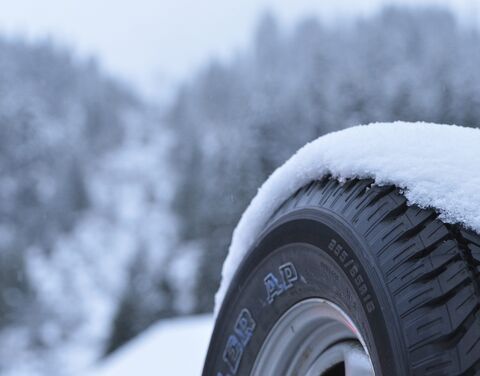
Snow in the spring and summer tires
Many car drivers switch from winter to summer tires after Easter. But what if it snows again in low-lying areas? AXA expert Patrick Villiger explains liability in the event of an accident.
Patrick Villiger, is it regarded as gross negligence if I cause an accident when driving with summer tires in spring in wintry conditions?
In principle no, as driving with summer tires in winter does not necessarily mean gross negligence. How you drive is much more important. Regardless of whether summer tires or winter ones suitable for winter driving have been fitted, it's always important to adjust how you drive to the prevailing conditions and to your car's equipment.
What does this mean in concrete terms?
For example, if you drive on flat but snowy roads, you should be especially careful with summer tires and keep an eye on the road ahead, i.e. drive slowly, brake carefully and keep a sufficient distance from the vehicle in front. However, if you're planning to drive over snow-covered mountain passes, your car should be suitably equipped.
What happens if drivers don't change how they drive?
If this is deemed to be gross negligent behavior, the driver may possibly have to meet part of the claim. However, it is possible for insurance to cover gross negligence, unlike other gross negligence offenses.
What type of gross negligence cannot be covered by insurance?
You must always expect financial consequences if you cause damage while you are speeding, driving under the influence of alcohol, narcotics, medication or driving when you are too tired. This is because insurers are legally obliged to take recourse against the driver or vehicle owner.
Tips for driving safely in winter
- Driving
You need to adopt a careful driving style on slippery roads. Pull away carefully: start by releasing the clutch slowly, be gentle with the gas pedal, and take care to avoid wheelspin. - If your car has a stick shift
If it's icy, pull away in second gear to prevent wheelspin. Shift up to a higher gear as quickly as possible. Keep the engine speed low when driving on snow – at higher revs, the wheels can more easily start to spin even in second or third gear. - Braking
When driving any modern vehicle equipped with anti-lock brakes in winter, just like in summer, the thing to do in an emergency is hit the brakes as fast and as hard as you can. The anti-lock system works best when the brake pedal is pushed all the way down and held there. Remember that braking distances on snow-covered or icy roads are much longer than usual, so stay around three times as far behind the car in front as you would under normal conditions. Always think ahead, especially when you’re approaching an intersection This is because the surface is often particularly slippery there as a result of all the cars braking – and particularly dangerous if you don't have winter tires. - Overtaking
If possible, don’t overtake at all. If you do need to overtake, you have to be very careful as you can easily lose traction when changing lanes. As well as leaving the grooves cut into your lane by traffic, where traction is highest, you could also be driving through a small snow drift that’s formed between lanes, which can cause the wheels to lose grip. - Choosing a route
Avoid routes involving mountain passes whenever possible. Take special care in places that are wet, shady or exposed to cold winds, as these are where black ice is most likely to form in winter at certain temperatures. Typical problem areas due to packed snow include bridges, roads through thick forests, and those next to waterways. - Stopping
Avoid stopping on a slope wherever possible because it’s especially hard to pull away again.





